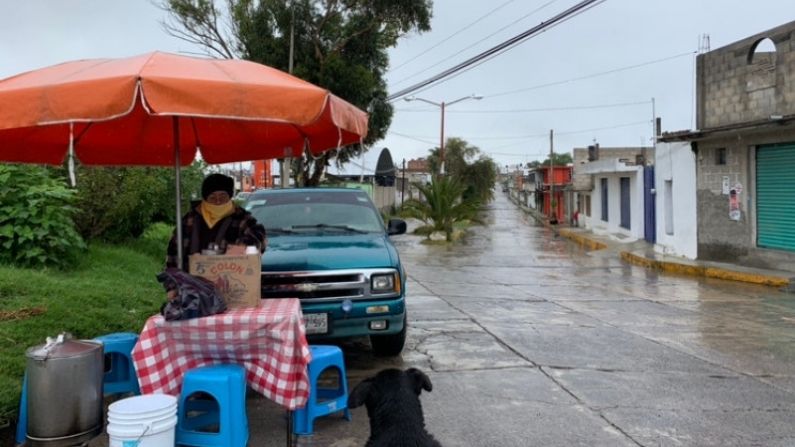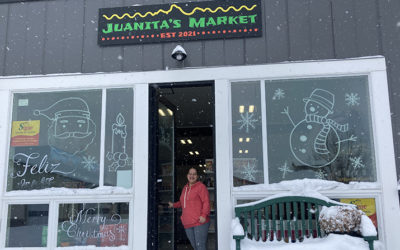If you’ve ever eaten a tamale–a Mexican delicacy made with a corn dough, normally wrapped in a corn husk–you’ve had a taste of a pre-Hispanic dish that’s sometimes upstaged in Mexican cuisine. KHOL Spanish-language correspondent Alicia Unger has been reporting on the history of tamales and their special connection to Tlaxcala, Mexico, where the majority of Jackson’s Latino community trace their roots.
Listen above to hear a conversation between KHOL News Director Kyle Mackie and Unger about her reporting in English followed by the full feature story in Spanish. The following interview transcript has been edited for clarity and brevity.
KYLE MACKIE/KHOL: Alicia, thank you so much for reporting this story.
ALICIA UNGER: No, thank you for taking interest in this special dish that is well known worldwide.
KHOL: Well, we’ve been excited about this one for a while because your reporting for this story started when you were in Tlaxcala last fall, I believe.
UNGER: Correct.
KHOL: And it starts with a tamale street vendor. I wonder if you can set the scene for us and describe, you know, what you saw?
UNGER: Well, I went to Tlaxcala to get to know the people and to get to know the place where the people that live here in Jackson is from. And it was a rainy day, for several days [it] was raining and it caught my attention that there was in a corner this lady with a stand, [a] little umbrella, a little table selling tamales. And it was no one there. And it calls my attention why in a day like this someone will, you know, try to make business? And her explanation is, ‘If I don’t sell, my kids don’t eat.’ And it struck me.
KHOL: That’s, you know, that’s really difficult to hear, and a sad image too — I know we have a photo of this vender on a pretty empty street on a very rainy day, not a lot of people outside. But I know you spoke to her about her business and when some of her busier days are. What did you learn from her about that?
UNGER: Well, I learned that the weekends and holidays, especially Christmas time, starting in November from the Day of the Dead to the Feb. 2, when is the Day of the Candelaria. And that’s when the special day for the tamales is. So, she told me how she prepares the tamales and delivers them home to home sometimes.
KHOL: Wow, okay, so a special day of tamales?
UNGER: Yes.
KHOL: And I know that this reporting sent you on a path to learn about the history of tamales, of this dish. Can you tell us a little bit about what you’ve learned?
UNGER: Well, I learned that tamales have a very [special] relationship with Tlaxcala. I was able to interview this lady who is an international promoter of the Mexican gastronomy. Her name is Mercedes Ahumada, and she explained to me that Tlaxcala means tamales. Tlaxcala means in [the Indigenous language] Nahuatl “the place from the corn bread,” which is a tamal.
KHOL: Oh, wow, really?
UNGER: So, that’s why I [was] like, ‘Oh my god! What a perfect story where I found this lady surviving [by] selling tamales in Tlaxcala.’ So, then I wanted to know more about it, and the story of tamales is just fantastic.
KHOL: Yeah. So, it has this fantastic story, but I also understand that you learned there’s been kind of some discrimination against tamales over the years?
UNGER: Yes, what Ahumada has told me is that since it’s so popular, and when the Spanish colony comes, brings new products, people relates that the new products could be better. And since tamales are created before tortillas, it’s too many, too easy to find them everywhere. So, people don’t give them the respect that they should because it’s something that they see every day. And many people don’t know the history of it. But the history is from the pre-Hispanic times, before the colonization, before the tortillas, and they’re known worldwide. And the tamales are more than cultural. They have a special relationship [with Mexican people], like a spiritual [connection], because they are in all the altars. In every religious celebration [there] are tamales there.
KHOL: Wow, like offerings?
UNGER: Yes, exactly.
KHOL: Well, thank you for your reporting. This is really interesting to hear about, and we’re excited to bring the listener now to your full story in Spanish.
UNGER: Thank you. Enjoy it.





